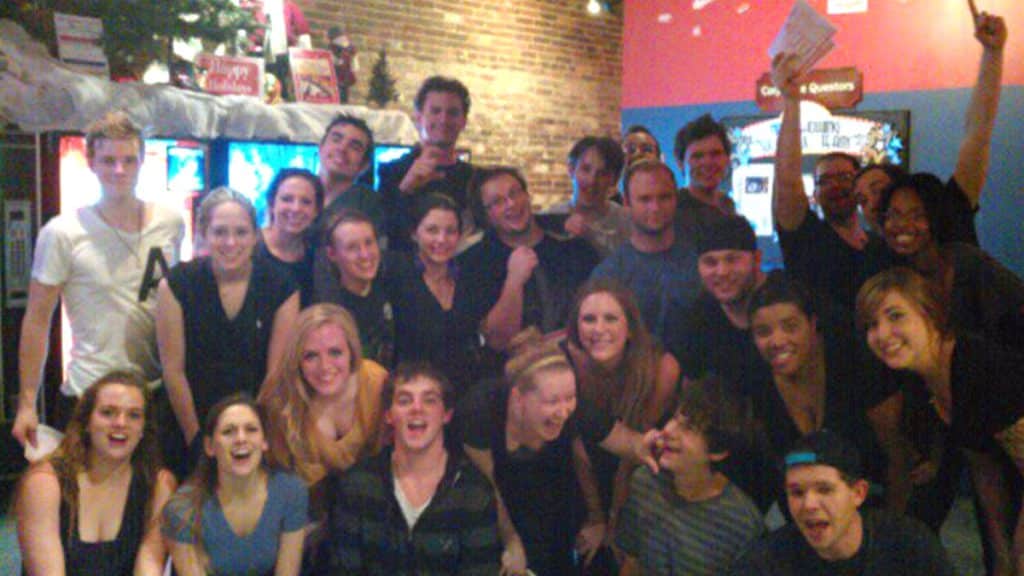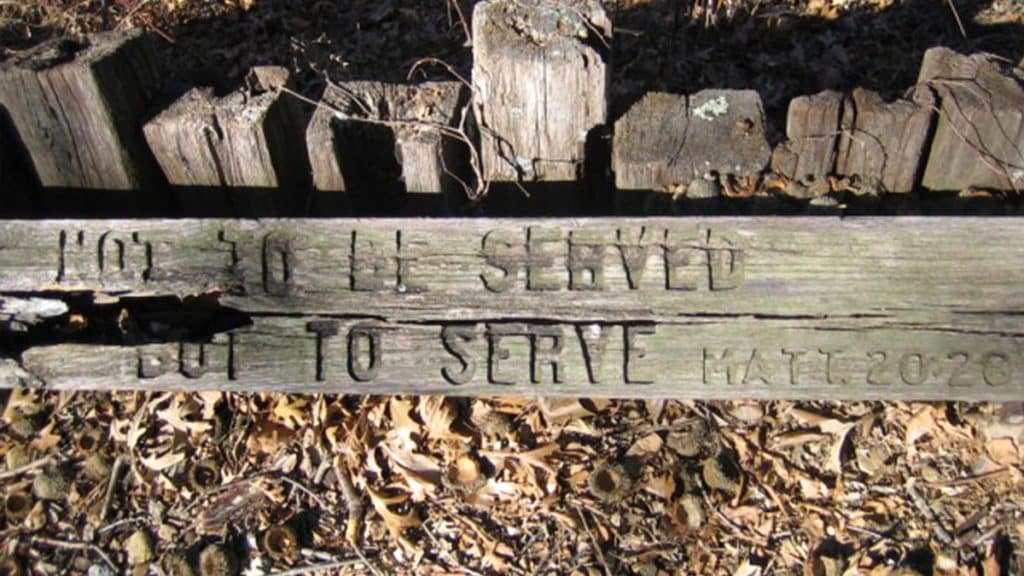“Full hands in, full hands out” is a mentality that means always come to a situation with something to offer and walk away from a situation with something to offer others.
When I served tables at Carrabba’s Italian Grill in Nashville, Tennessee, my boss, Eric Martino, used a phrase that didn’t seem life-changing at the time but instructs me as a disciple of Jesus years later.
I waited tables at Carrabba’s from January 2011 to April 2012 for one year, three months, and eleven days (not that I was counting). I’m grateful for that season of life, as difficult as it felt at the time.
Eric led our staff of servers who were affectionately and officially called “Carrabbamicos.” He was a great leader in food service (and I’m sure he still is). His ability to rally the troops, maintain high standards, and deliver excellent service day in and day out was truly remarkable. That’s why he was able to attract and retain an incredible wait staff. Our group had a special bond, and everyone knew it. It was because of Eric’s charismatic and passionate leadership.
Here’s a picture of our staff at laser tag night around Christmastime.

The Phrase That Lodged in My Mind
You’ve probably heard that everyone should have a job in food service at some point to teach them important life lessons.
It’s true.
There are lessons I would not have learned as deeply without my experience at the restaurant. One of them is what Eric said to us constantly:
“Full hands in, full hands out.”
What he meant by that was simple: Whenever you are coming into the restaurant’s “back of house” from the dining area, fill your hands up with dirty dishes; and whenever you are going out into the dining area, take something out with you to the tables.
Eric simultaneously helped us to think like team members and like solo entrepreneurs for our section of tables. It was a good balance between collectivism and individualism.
He was the Gordon Bombay of the restaurant business for us.
Eric trained us as a group to serve each other by picking up dishes for one another and bringing them to the dishwasher.
Then he wanted us to walk back out into the dining area with “full hands out.” Even if we didn’t need anything for our tables immediately, we could help someone else or get our tables more water. We could fill up drinks, pick up bread baskets, or fill up the ice bins.
The idea was that if we all thought like teammates, we would thrive in efficiency as a restaurant.
And we did.
We crushed it every night. We were one of the highest-grossing restaurants in the chain out of roughly 150 restaurants across the country.
A Disciple’s Identity as Servant
Eric’s phrase “Full hands in, full hands out” ended up sticking with me and even transformed my way of thinking about how to approach life situations. The words lodged in my mind as he repeated them each day, and I’ve often thought about how this mentality applies to our lives as disciples of Jesus—as servants.
If serving tables is a metaphor for what makes us great in the kingdom of God, then this lesson translates well. In the Scriptures, we’re called “slaves” and “servants” of God (e.g., Matt. 20:27; Rom. 6:16). We’re not mere slaves or servants, for we are also sons and daughters. Service in the kingdom of God is qualitatively different than serving any human master, and this identity as servants gives us an important indication of our role in the kingdom.
A fictional story told by Jesus in Luke 17:7–10 makes this point clear.
“Suppose one of you had a servant plowing or looking after the sheep. Would he say to the servant when he comes in from the field, ‘Come along now and sit down to eat’? Would he not rather say, ‘Prepare my supper, get yourself ready and wait on me while I eat and drink; after that you may eat and drink’? Would he thank the servant because he did what he was told to do? So you also, when you have done everything you were told to do, should say, ‘We are unworthy servants; we have only done our duty.’”
In case it wasn’t clear before this parable, we’re not the ones in charge. God is.
Even when we’ve done our duty, we must still accept our role as servants. Tim Keller emphasizes this well in his sermon on this passage. We are not any less than servants, but we are certainly more than servants.
Our servanthood is a primary identity marker for disciples of Jesus. As disciples, we would do well to embrace this mentality of “full hands in, full hands out.”
Applied to Life
When our two young children climb out of our van, leaving behind them a trail of granola, toys, clothes, shoes, and miscellaneous trash, I can think to myself:
Full hands in, full hands out.
When I’m gathering with friends for dinner, I can bring something to add value, even when the meal is provided.
Full hands in, full hands out.
As I enter the church parking lot on Sunday morning, I can pray, Lord, may I be your hands, feet, voice, and ears for the building up of your body. When I do so, I am in essence applying metaphorically what I learned to apply literally as a server.
Full hands in, full hands out.
I can bring a word of encouragement to someone in the foyer of the church building, I can bring full hands as I pray with someone in the auditorium after worship service, and I can listen to a hurting friend pour out their heart after a difficult week.
“Full hands in” at church means that I come to the people of God ready to serve.
And when I leave the church building, I leave with full hands too. I don’t come just to serve; I come also to receive. Yes, “the Son of Man did not come to be served, but to serve” (Matt. 20:28). We’re called to serve; that’s clear. But we’re also part of a body, and every part needs to be “built up” (Eph. 4:12). In order for us to work together, we have to allow others to build us up too!

A picture I took by Turkey Creek at Ozark Christian College during college.
That means:
- We’re not always the voice; sometimes we’re the ears.
- We’re not always the helping hands; sometimes we’re the bleeding heart.
- We’re not always the feet that go; sometimes we’re the feet that stay and receive support.
We’re all members of one body, and each part of the body of Christ has a role that supports the corporate body. We’re solo entrepreneurs and team members.
So when we’re leaving church, we can leave with “full hands out.”
“Full hands out” means we walk away with something to give the world.
The Word is not just for us; it’s for everyone. As the church doors open at the end of the service, we can ready ourselves for action by repeating in our hearts:
Full hands in, full hands out.
When we feel discouraged and a friend sends us a text, we can simply receive in that moment because:
Receiving takes as much humility as serving.
Our time will come when we’ll be able to give with full hands again.
“Full hands in, full hands out” means that our hands are always full, whether we’re coming or going.
When we’re headed to the office, packing up the house for a trip, or putting the kids to bed, we can repeat the phrase:
Full hands in, full hands out.
For me, with two young kids at home, I can change one more diaper, grab one more item to put in the car, or take one more bag of trash out to the curb.
This is the heart of a full-time disciple of Jesus, one who is all in. Our servanthood to God is 24/7. We don’t do our time and then take it easy. We’re always on in this way (even as we rest). We keep serving. A servant of Jesus always comes to the table and leaves the table with hands full.
The crucial idea here is that when we enter the next life, we won’t leave this one empty-handed.
We’ll have become so rich in the kingdom of heaven that, on our way out of this world, we’ll find our hands are full going into the next.
So, brothers and sisters, allow me to submit this phrase to you. Let it sink into your heart and soul. It will serve you not only for this life but also for the next.
As you go about your day and find your hands empty, let the phrase resound in your mind.
Full hands in, full hands out.
Read more about the importance of serving from Chad Harrington, the author of this blog, in his book with Jim Putman, The Revolutionary Disciple.

Jim Putman’s and Chad Harrington's The Revolutionary Disciple
Walking Humbly with Jesus in Every Area of Life
A comprehensive discipleship strategy for your home, work, and church. You’ll benefit greatly from reading this book with your discipleship group or church staff.
— Robby Gallaty, pastor and author of Replicate
A long overdue call to us as leaders to humble ourselves before the Lord and the people we lead.
— Ed Litton, pastor and president of the Southern Baptist ConventionGet Product
